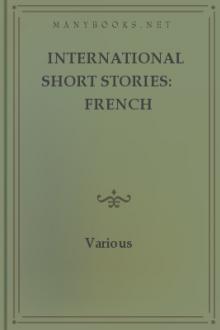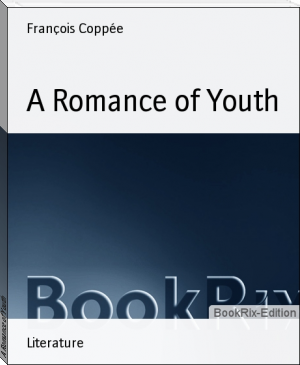International Short Stories: French, - [best ebook reader ubuntu txt] 📗

- Author: -
- Performer: -
Book online «International Short Stories: French, - [best ebook reader ubuntu txt] 📗». Author -
At these words Zadig threw himself at her feet and bathed them with his tears. Astarte raised him with great tenderness and thus continued her story: “I now saw myself in the power of a barbarian and rival to the foolish woman with whom I was confined. She gave me an account of her adventures in Egypt. From the description she gave me of your person, from the time, from the dromedary on which you were mounted, and from every other circumstance, I inferred that Zadig was the man who had fought for her. I doubted not but that you were at Memphis, and, therefore, resolved to repair thither. Beautiful Missouf, said I, thou art more handsome than I, and will please the Prince of Hircania much better. Assist me in contriving the means of my escape; thou wilt then reign alone; thou wilt at once make me happy and rid thyself of a rival. Missouf concerted with me the means of my flight; and I departed secretly with a female Egyptian slave.
“As I approached the frontiers of Arabia, a famous robber, named Arbogad, seized me and sold me to some merchants, who brought me to this castle, where Lord Ogul resides. He bought me without knowing who I was. He is a voluptuary, ambitious of nothing but good living, and thinks that God sent him into the world for no other purpose than to sit at table. He is so extremely corpulent that he is always in danger of suffocation. His physician, who has but little credit with him when he has a good digestion, governs him with a despotic sway when he has eaten too much. He has persuaded him that a basilisk stewed in rose water will effect a complete cure. The Lord Ogul hath promised his hand to the female slave that brings him a basilisk. Thou seest that I leave them to vie with each other in meriting this honor; and never was I less desirous of finding the basilisk than since Heaven hath restored thee to my sight.”
This account was succeeded by a long conversation between Astarte and Zadig, consisting of everything that their long-suppressed sentiments, their great sufferings, and their mutual love could inspire in hearts the most noble and tender; and the genii who preside over love carried their words to the sphere of Venus.
The woman returned to Ogul without having found the basilisk. Zadig was introduced to this mighty lord and spoke to him in the following terms: “May immortal health descend from heaven to bless all thy days! I am a physician; at the first report of thy indisposition I flew to thy castle and have now brought thee a basilisk stewed in rose water. Not that I pretend to marry thee. All I ask is the liberty of a Babylonian slave, who hath been in thy possession for a few days; and, if I should not be so happy as to cure thee, magnificent Lord Ogul, I consent to remain a slave in her place.”
The proposal was accepted. Astarte set out for Babylon with Zadig’s servant, promising, immediately upon her arrival, to send a courier to inform him of all that had happened. Their parting was as tender as their meeting. The moment of meeting and that of parting are the two greatest epochs of life, as sayeth the great book of Zend. Zadig loved the queen with as much ardor as he professed; and the queen loved him more than she thought proper to acknowledge.
Meanwhile Zadig spoke thus to Ogul: “My lord, my basilisk is not to be eaten; all its virtues must enter through thy pores. I have inclosed it in a little ball, blown up and covered with a fine skin. Thou must strike this ball with all thy might and I must strike it back for a considerable time; and by observing this regimen for a few days thou wilt see the effects of my art.” The first day Ogul was out of breath and thought he should have died with fatigue. The second he was less fatigued, slept better. In eight days he recovered all the strength, all the health, all the agility and cheerfulness of his most agreeable years.
“Thou hast played at ball, and thou hast been temperate,” said Zadig; “know that there is no such thing in nature as a basilisk; that temperance and exercise are the two great preservatives of health; and that the art of reconciling intemperance and health is as chimerical as the philosopher’s stone, judicial astrology, or the theology of the magi.”
Ogul’s first physician, observing how dangerous this man might prove to the medical art, formed a design, in conjunction with the apothecary, to send Zadig to search for a basilisk in the other world. Thus, having suffered such a long train of calamities on account of his good actions, he was now upon the point of losing his life for curing a gluttonous lord. He was invited to an excellent dinner and was to have been poisoned in the second course, but, during the first, he happily received a courier from the fair Astarte. “When one is beloved by a beautiful woman,” says the great Zoroaster, “he hath always the good fortune to extricate himself out of every kind of difficulty and danger.”
THE COMBATSThe queen was received at Babylon with all those transports of joy which are ever felt on the return of a beautiful princess who hath been involved in calamities. Babylon was now in greater tranquillity. The Prince of Hircania had been killed in battle. The victorious Babylonians declared that the queen should marry the man whom they should choose for their sovereign. They were resolved that the first place in the world, that of being husband to Astarte and King of Babylon, should not depend on cabals and intrigues. They swore to acknowledge for king the man who, upon trial, should be found to be possessed of the greatest valor and the greatest wisdom. Accordingly, at the distance of a few leagues from the city, a spacious place was marked out for the list, surrounded with magnificent amphitheaters. Thither the combatants were to repair in complete armor. Each of them had a separate apartment behind the amphitheaters, where they were neither to be seen nor known by anyone. Each was to encounter four knights, and those that were so happy as to conquer four were then to engage with one another; so that he who remained the last master of the field would be proclaimed conqueror at the games.
Four days after he was to return with the same arms and to explain the enigmas proposed by the magi. If he did not explain the enigmas he was not king; and the running at the lances was to be begun afresh till a man would be found who was conqueror in both these combats; for they were absolutely determined to have a king possessed of the greatest wisdom and the most invincible courage. The queen was all the while to be strictly guarded: she was only allowed to be present at the games, and even there she was to be covered with a veil; but was not permitted to speak to any of the competitors, that so they might neither receive favor, nor suffer injustice.
These particulars Astarte communicated to her lover, hoping that in order to obtain her he would show himself possessed of greater courage and wisdom than any other person. Zadig set out on his journey, beseeching Venus to fortify his courage and enlighten his understanding. He arrived on the banks of the Euphrates on the eve of this great day. He caused his device to be inscribed among those of the combatants, concealing his face and his name, as the law ordained; and then went to repose himself in the apartment that fell to him by lot. His friend Cador, who, after the fruitless search he had made for him in Egypt, was now returned to Babylon, sent to his tent a complete suit of armor, which was a present from the queen; as also, from himself, one of the finest horses in Persia. Zadig presently perceived that these presents were sent by Astarte; and from thence his courage derived fresh strength, and his love the most animating hopes.
Next day, the queen being seated under a canopy of jewels, and the amphitheaters filled with all the gentlemen and ladies of rank in Babylon, the combatants appeared in the circus. Each of them came and laid his device at the feet of the grand magi. They drew their devices by lot; and that of Zadig was the last. The first who advanced was a certain lord, named Itobad, very rich and very vain, but possessed of little courage, of less address, and hardly of any judgment at all. His servants had persuaded him that such a man as he ought to be king; he had said in reply, “Such a man as I ought to reign”; and thus they had armed him cap-à-pie. He wore an armor of gold enameled with green, a plume of green feathers, and a lance adorned with green ribbons. It was instantly perceived by the manner in which Itobad managed his horse, that it was not for such a man as he that Heaven reserved the scepter of Babylon. The first knight that ran against him threw him out of his saddle; the second laid him flat on his horse’s buttocks, with his legs in the air, and his arms extended. Itobad recovered himself, but with so bad a grace that the whole amphitheater burst out a-laughing. The third knight disdained to make use of his lance; but, making a pass at him, took him by the right leg and, wheeling him half round, laid him prostrate on the sand. The squires of the game ran to him laughing, and replaced him in his saddle. The fourth combatant took him by the left leg, and tumbled him down on the other side. He was conducted back with scornful shouts to his tent, where, according to the law, he was to pass the night; and as he climbed along with great difficulty he said, “What an adventure for such a man as I!”
The other knights acquitted themselves with greater ability and success. Some of them conquered two combatants; a few of them vanquished three; but none but Prince Otamus conquered four. At last Zadig fought him in his turn. He successively threw four knights off their saddles with all the grace imaginable. It then remained to be seen who should be conqueror, Otamus or Zadig. The arms of the first were gold and blue, with a plume of the same color; those of the last were white. The wishes of all the spectators were divided between the knight in blue and the knight in white. The queen, whose heart was in a violent palpitation, offered prayers to Heaven for the success of the white color.
The two champions made their passes and vaults with so much agility, they mutually gave and received such dexterous blows with their lances, and sat so firmly in their saddles, that everybody but the queen wished





Comments (0)